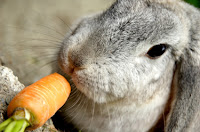
Rabbits may seem like low-maintenance pets because they are kept in cages, but like any pets, they require the right kind of care and attention. To raise healthy, happy rabbits, you may want to provide them with an all-natural diet.A nice mix of hay, pellets and fresh vegetables as well as fresh water will make your rabbit healthy and happy.
Hay
Fresh hay should make up the bulk of your rabbit's diet and needs to be readily available at all times. Adult rabbits can eat timothy, grass, and oat hays, while younger rabbits should be fed alfalfa. Alfalfa should not be given to adult rabbits because of the higher protein and sugar content. Hay is important for rabbits because it provides the essential fiber needed for good digestive health and it helps wear down a rabbit's teeth (which continuously grow) for good dental health. Placing hay at one end of a litter box will also encourage the use of the litter box, as rabbits tend to eat hay and poop at the same time.
When choosing hay, make sure it looks and smells fresh. Do not choose a hay that looks brown or moldy or no longer smells like fresh cut grass. Store hay in a dry place in a container that allows air flow to keep it from getting moldy. Buying hay in bulk from a local farmer tends to be much more economical than buying bags from a pet store.
Vegetables
A varied assortment of vegetables should be a part of your rabbit's daily diet. When choosing vegetables look for something fresh and free of pesticides. Always wash your vegetables thoroughly before feeding them to your rabbit. Feed new vegetables in small quantities until you can judge if your rabbit reacts well to them. Do not feed rabbits the leaves from houseplants as many are poisonous to rabbits. For a full list of poisonous plants, visit the Sacramento House Rabbit Society's page on the subject.
Rabbit may enjoy some of the following vegetables:
- Basil
- Bok choy
- Broccoli leaves (stems or tops can make rabbits gassy)
- Carrot tops (carrots are high in calcium and should be given sparingly)
- Celery
- Cilantro
- Clover
- Collard greens
- Dandelion leaves
- Dill
- Kale (sparingly)
- Lettuce - romaine or dark leaf (no iceburg lettuce and no cabbage)
- Mint
- Mustard greens
- Parsley
- Water cress
Water
Fresh water must always be available to your rabbit. If you have a cage, a hanging water bottle is a fine option. Rabbits will also drink from a water bowl. On a hot day you can drop an ice cube or two in your rabbits water dish. If your rabbit does not seem to be drinking enough water you can leave the vegetables fairly wet when you present them.
Pellets
These should be purchased so that they are fresh, as bunnies will turn their noses up at stale pellets. Look for pellets that are high in fiber and low in protein. You will need to limit your rabbit's pellet intake as he/she ages. Pellets that are high in protein can lead to obesity and other health issues in rabbits.
Fruits
To ensure your rabbits health they should be given treat only occasionally. Do not feed your rabbit items high in carbohydrates like breads, crackers, pasta, pretzels, cookies, chips, or cereal. Although branded for rabbits, many commercially-sold bunny treats are high in fat and sugar, such as yogurt chips, and should not be given. Never give chocolate as it is toxic to rabbits.
Fruit is the best option for a treat, but again you should give it only in small amounts because of the sugar content. We try to purchase organic fruits that we know are free of pesticides. Like vegetables, be sure that they are thoroughly washed.
Some fruits that rabbits enjoy include:
- Strawberries
- Raspberries
- Bananas
- Pineapple
- Apples (no seeds)
For more information about the types and amounts of food you should provide your bunny as he/she matures from birth into old age, see the House Rabbit Society's article, FAQ: Diet.

إرسال تعليق